Each month, we will present an article in the “Path To The Throne” series, a set of stories that tells how the LA Kings became the LA Kings. This month’s article centers around defenseman Brandt Clarke, one of the most exciting and promising defensive prospects in the NHL, who has cracked the Kings on a full-time basis this season.
Sean O’Donnell stops for a moment when contemplating LA Kings defenseman Brandt Clarke, searching for the right word.
Savant?
O’Donnell is not sure ‘savant’ fits.
But the fact he considers a term that denotes someone of exceptional aptitude helps to bring things into focus as it relates to Brandt Clarke and what he means to this NHL franchise.
First, Clarke represents a player to whom the Kings hope Drew Doughty can pass the torch to somewhere down the line.
Secondly, and perhaps even more importantly, the organizational care that has gone into and is continuing to go into nurturing and developing Clarke is inexorably linked to the previous statement.
A player development coach for the LA Kings, O’Donnell has a unique perspective on Clarke and his place within the organization. Nearing the end of his impressive 1,224-game NHL career O’Donnell was paired with a raw, young defenseman named Drew Doughty.
Clarke is not Doughty. Not yet at any rate. But there are lines to be drawn between the two to be sure.
“There’s a lot of similarities there in the way they approach things and the way they’re kind of lighthearted off the ice but when they get on the ice they compete and they want to win,” said O’Donnell who won a Stanley Cup with Anaheim in 2006.
No one knows Clarke better, nor has had a better view of the 21-year-old’s development, than O’Donnell and development partner Matt Greene who won two Stanley Cups skating alongside Doughty for the Kings in 2012 and 2014.
“He absorbs stuff,” O’Donnell explained hearkening back to the ‘savant’ question. “You’ll ask him something about a play two years ago in the Stanley Cup Final and he’ll correct me and say no it was this player that did that.”
“He’s confident in what he can do. He’s confident in the way he can play,” added Greene who played 615 NHL games and makes his home in the LA area, periodically working with Clarke when Greene’s travel commitments allow now that Clarke is an everyday NHLer.
Over the years Chris Clarke has had to choose his words carefully in describing son Brandt’s connection with the game of hockey.
That’s because Chris Clarke often explains that Brandt was in full hockey gear basically before his middle son was out of diapers.
But he’s quick to reassure people that this isn’t because Brandt spent an abnormally long time in diapers, but rather Brandt took to the ice and to the game of hockey at a preternaturally young age.
It has become a bit of a family joke in a family that loves a good laugh.
Brandt’s first ice memory is of being a toddler and trailing in front of or behind his dad on the world-famous Rideau Canal, the world’s longest ice-skating rink located not far from their Ottawa-area home.
Ice and family. Family and ice.
Those are the two constants for the skilled young defenseman.
Clarke talks to at least one of his parents every day. He speaks regularly to his brother Graeme who is two years older and with the Minnesota Wild organization playing for their American Hockey League affiliate in Iowa, and likewise his younger sister Mackenzie who is two years younger than Clarke.
Chris Clarke grew up in Southern Ontario on the north shores of Lake Erie and played junior hockey there. He studied to become a dentist and is now an orthodontist.
During a recent telephone conversation, he shared that he was in Iqaluit in Canada’s far north territory of Nunavut. He’s been making trips to remote northern communities for two decades or more providing much-needed dental care and treatment.
When the boys were still quite young their father installed a synthetic shooting/skating pad in the basement of their home.
It was a bit dusty down there, but the brothers loved it and would descend to the basement hockey room on most evenings.
Initially Clarke was more of an assistant, passing pucks to Graeme but as soon as he was old enough to get into skates and take shots himself the two were at it non-stop.
Calendars were taped to the wall to track shots taken and Graeme recalled how the calendars marked not just the repetition but the healthy competition that continues to drive both boys into their respective professional careers.
If one of the boys shot 200 pucks the other would want to shoot 300 and so on.
”Brandt just wanted to follow along and follow along at the same speed or pace if not faster,” Chris Clarke recalled.
Despite the age difference, Graeme, 23, never found his younger brother’s constant tagging along a chore. In fact, quite the opposite.
“It was never annoying,” Graeme said. “It was good that he was around to do stuff.”
Maybe when Brandt suddenly hit a growth spurt around age 14 and Graeme suddenly wasn’t the bigger, older brother anymore, it became a tad bit annoying.
“That’s been frustrating ever since,” Graeme joked.
Basement workouts, backyard soccer or baseball games or, given that the family lived on the Ottawa River, some winter shinny, there appears to be about the Clarke family a kind of perpetual motion that continues to this day.
The boys return home like clockwork when their respective hockey seasons are over and the entire family falls into comfortable, satisfying routines that include time on the water and lots of time at the rink and gym.
“It’s great, it keeps you kind of grounded knowing you can always come back to that family unit,” Graeme explained. “It’s like old times. It seems it’s a place you can always feel like you’re coming back to.”
Whether it’s been a good season or whether there have been injuries or setbacks, the Clarke home is a place of comfort and acceptance.
“Everyone’s around to help each other,” Graeme said. “We support each other in everything.”
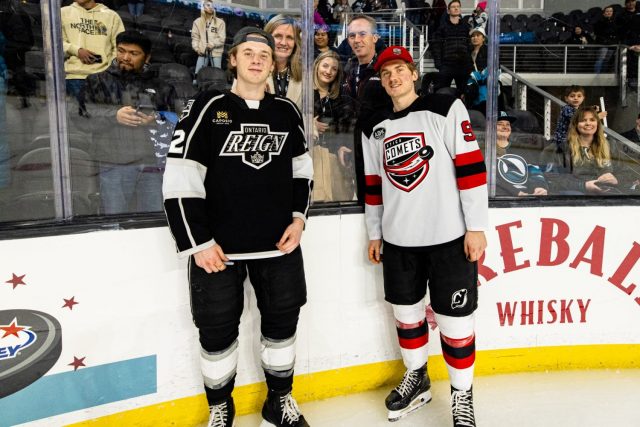
There are scrimmages and Saturday and Sunday morning sprinting exercises that involve the entire family.
“We do this together and we all look forward to that,” Chris Clarke added.
There are trips to the family’s favorite fries and burger truck on the Ottawa River.
“I’m already looking forward to next summer,” Chris Clarke said. “I know Brandt looks forward to it, we all do too. It’s just a fun time for us. There’s some pressure off from performance required during the season. It’s pressure off time and we make it fun.”
The two brothers work out at the same gym every summer, spending hours together in the car in their various comings and goings. As it was in the basement, the boys keep track of their workout routines and have candid conversations about what areas of their respective games need the most work. Not surprisingly Graeme remains one of his brother’s staunchest supporters even if summer scrimmages can be a humbling experience when he’s facing off against Brandt.
“If I’m being honest, he’s just so good out there,” Graeme said. “He’s still coming out of his shell. He just keeps getting better and better. There’s no easy play on him. For me he’s ready for this. I’m really happy for him and it’s not a surprise to me. He’s just kind of scratching the surface here, too. This isn’t all he’s got; he’s got a lot more to give.”
So, yes, one hand this is a story about a young man who has the potential to lift people from their seats and to change the course of a franchise’s trajectory. But, let’s be honest, the NHL draft is full of those kinds of young men every year.
The reality is that this is as much a story about an organization’s care and responsibility in ensuring that such potential is realized.
It doesn’t happen all the time. And there’s no sure path to success.
So far, though, the LA Kings have checked every box.
“Sometimes you like to treat all the kids the same and then there’s other times when you see something and a kid you want to make sure that you nurture as much as you can,” O’Donnell said.
Clarke is one of those special cases.
“We thought it was important, the Kings, to kind of plant that seed early and create that relationship early so that when he does turn pro it’s there’s no introduction, there’s already a trust, there’s already a relationship there,” O’Donnell added.
The challenge, simple yet so important, is in helping Clarke find the critical balance of playing at an elite level on both sides of the puck while allowing him to make the most of his rare offensive gifts.
“Offensively the way he sees the game and the way he can control the tempo of a game on the power play, it’s really hard, it’s almost impossible to teach that,” O’Donnell said. “So, you want to take that and teach some other things that you need to play to be a complete player in the NHL. We’re just trying to help Brandt along the way. Say, okay, these things that you do right now that’ll translate to the next level, but some of these things we have to get better at, or we have to eliminate, because they won’t.”
A lot of that has to do with positioning.
“You get to your spot and then kind of assess what’s going on because the NHL’s so good and the players are so big and so strong that if you’re not in the right spot and they’re in your spot then it’s almost like you’re on the outside looking in,” O’Donnell explained. “That’s probably the biggest adjustment.”
Patience? Sure. It has required some from both a player who might have imagined a shorter path to the NHL and the organization as well.
“That’s hard, it’s really hard for a player of his caliber and his mindset,” Greene acknowledged.
And there were moments when Clarke wanted more and wanted it faster.
“Was he happy all the time with it? No. There was disappointment and maybe some frustration,” Greene said. “But he did a great job of being a pro and not dwelling on that frustration.”
Good game, bad game, healthy scratch, sent back to junior, Clarke showed up for work the next day.
“It’s such a great attribute that he has,” Greene said. “He wants to play at a high level and contribute.”
Already the signs are there that the tutelage is paying off as Clarke has adjusted to life as the team’s top offensive defenseman with Doughty out of action long-term.
“You see growth, you see a lot of growth,” Greene said. “I think there’s a lot more to come in terms of his overall game. His goal is to be a great player in this league. That’s on him, he’s done a great job working hard for that and paying attention to details.”
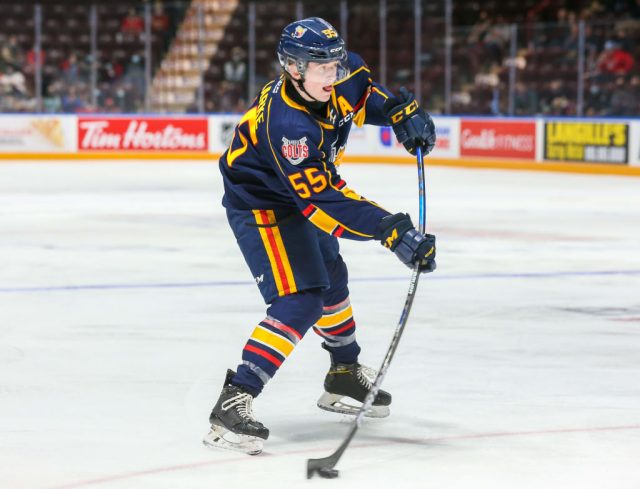
Photo by Chris Tanouye/Getty Images
Marty Williamson has seen this process up close as coach of the Barrie Colts of the Ontario Hockey League with whom Clarke spent parts of three seasons.
Williamson has high praise for the hands-on approach to development the Kings have shown while also being respectful of Williamson’s job as Clarke’s junior coach.
“I just think the message he was getting from the LA Kings and from myself was so consistent it just reinforced what he needed to do,” Williamson said. “They knew they had a wonderful talent.”
Clarke has gone from the kid who simply showed up at all levels of youth hockey and beyond and was head and shoulders better than pretty much everybody else, to someone who understands you have to earn the chances at the highest level and you have to earn the trust of the people around you as a player.
“Brandt’s biggest growth has been in his maturity,” said Williamson. “Understanding things, understanding those danger times.”
The former defenseman has coached lots of high-end talent along the way during his 15 years as a head coach in the OHL.
“I’ve never had anyone with an IQ like Brandt Clarke,” Williamson said. “He knows where everyone is on the ice. He’s a high-level passer. Just the really strong decision making that he’s showing.”
By the time he left Barrie his discipline was better, he worked out more diligently, he was on time, his eating habits matured, and he got stronger.
“Brandt learned and what this did for him it made him even better,” Williamson said. “It puts a big smile on my face I can tell you that. He’s ready for this opportunity now.”
O’Donnell’s role as a mentor to a young Drew Doughty is similar to the role now being filled by veteran defender and Stanley Cup champion Joel Edmundson when it comes to mentoring Clarke.
Edmundson, 31, sits next to Clarke in the dressing room with Mikey Anderson on the other.
The two more experienced defenders spend many days needling Clarke and trying to get him to open up about his life away from the rink.
“We try to get him going and getting stories out of him. He’s still a goofy little kid,” Edmundson said.
It’s the kind of affection that is typical between a veteran who has logged 550 regular season games, won a Stanley Cup and been to another Stanley Cup final and young man still learning the game.
“There are lots of interesting conversations we have. It’s been fun. When we get him laughing his laugh is kind of contagious,” Edmundson said.
What do they say about laughter being the best medicine?
Clarke may be happy-go-lucky but he’s also a perfectionist.
“He’s hard on himself,” Edmundson said. “He wants to be the guy with the puck on his stick all the time, he wants to be one of the best players every night. And he can beat himself up at times.”
That’s where Edmundson’s counsel is so important.
“I was the same way my first couple of years, yelling at the refs, doing things that I don’t do now,” Edmundson said.
Already Edmundson is seeing Clarke have the confidence to get past mistakes and to talk about why plays worked or didn’t with his partner.
“He’s not afraid to talk up and ask questions,” Edmundson said.
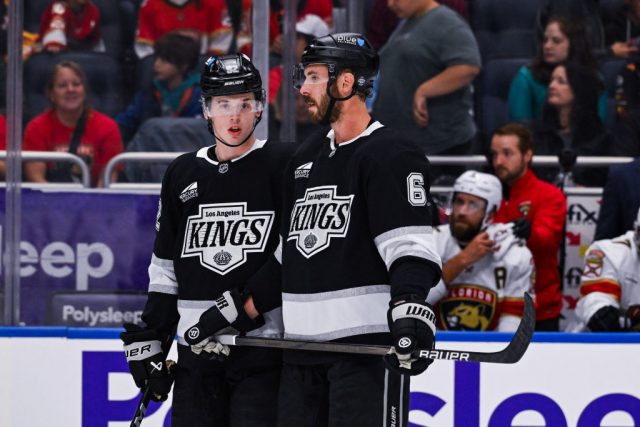
Photo by David Kirouac/Icon Sportswire via Getty Images
Brandt Clarke is not just a lump of clay even if there is an element of molding that is obvious in this process.
He’s a human being and very self-aware not only of his potential but of what must go into unlocking it fully.
He realizes the special care and attention bestowed on him by Greene and O’Donnell is different from the experiences of lots of NHL prospects.
“They just said they wanted to be really hands-on with me,” Clarke said. “They wanted to see the coaching staff, they wanted to see the facility, they wanted to see where I was living. I was grateful for their help. They pretty much watched all my games they sent me clips of stuff that was going on. They’d come on the ice with me and skate with me and show me stuff and show me in-zone stuff and how to kill plays and then when I went back to the OHL again that year they were still coming out all the time just observing, taking me out to dinner, making sure I know that I’m still being looked upon well and everything. I’m fortunate to have them in my corner that’s for sure.”
The line that every draftee hears from NHL coaches and development staff is that the draft isn’t the end of the journey, it’s the start of one.
In some ways it feels like this season, with Doughty injured early in pre-season, is the start of the next phase of a journey whose end point is far, far in the distance.
“I don’t even know what the right words are. But I’m proud of what I’ve accomplished. What I’ve been able to do,” Clarke said. “There’s a lot of people from when I was even really young probably didn’t think I was going to be the player that I turned out to be. Whether it was the way I skated or whether it was how everyone thought I was super offensive or whatever it may be, there were a lot of people telling me that it wasn’t going to work at the next level since I was 14 years old.”
“I was really happy with how I could block out the noise and kind of just played my game and believe in my myself, that I knew how to control the game and knew how to pick my moments well, that I build trust with every coach that I’ve had and I think I’ve done so,” he added.
“That’s what I’m trying to do at the end of the day,” Clarke said. “Just trying to build trust with the teammates that I have and the coaches that I have at that exact moment. Accomplishing that at almost every level I’ve been at so far has been, it’s something I’m proud of for sure.”
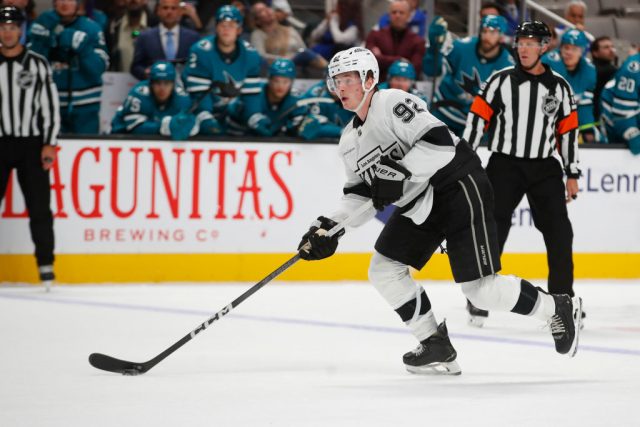
Photo by Scott Dinn/Icon Sportswire via Getty Images

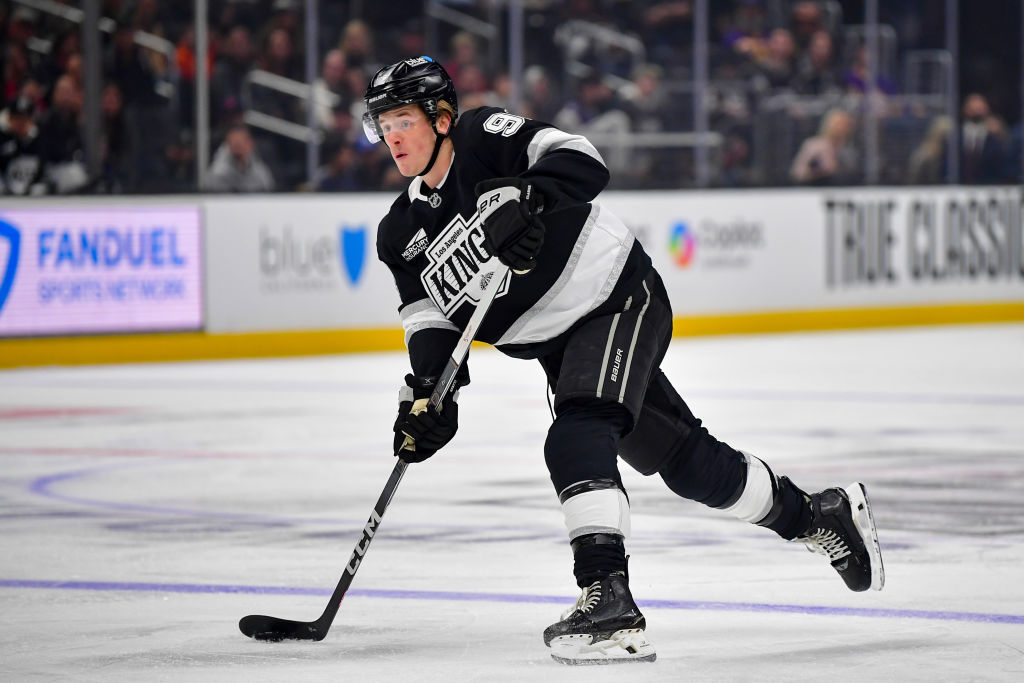
Rules for Blog Commenting
Repeated violations of the blog rules will result in site bans, commensurate with the nature and number of offenses.
Please flag any comments that violate the site rules for moderation. For immediate problems regarding problematic posts, please email zdooley@lakings.com.